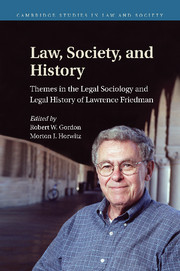Book contents
- Frontmatter
- Contents
- Contributors
- Introduction
- PART I OVERVIEWS AND ASSESSMENTS OF FRIEDMAN'S WORK
- PART II APPLICATIONS OF CONCEPTS, INSIGHTS, AND METHODS IN FRIEDMAN'S WORK
- PART III THE LEGAL PROFESSION
- PART IV LAW AND LARGE AREAS OF SOCIAL LIFE
- PART V FACTS FROM THE UNDERGROUND: DIGGING LEGAL HISTORY OUT OF THE CELLAR
- 16 Historian in the Cellar
- 17 The Discreet Charm of Inquisitorial Procedure
- 18 “Keep Negroes Out of Most Classes Where There Are a Large Number of Girls”
- 19 Taking Legal Realism Offshore
- PART VI PERSPECTIVES FROM OTHER CONCEPTUAL WORLDS
- Index
- Titles in the series
19 - Taking Legal Realism Offshore
The Contributions of Joseph Walter Bingham to American Jurisprudence and to the Reform of Modern Ocean Law
Published online by Cambridge University Press: 07 October 2011
- Frontmatter
- Contents
- Contributors
- Introduction
- PART I OVERVIEWS AND ASSESSMENTS OF FRIEDMAN'S WORK
- PART II APPLICATIONS OF CONCEPTS, INSIGHTS, AND METHODS IN FRIEDMAN'S WORK
- PART III THE LEGAL PROFESSION
- PART IV LAW AND LARGE AREAS OF SOCIAL LIFE
- PART V FACTS FROM THE UNDERGROUND: DIGGING LEGAL HISTORY OUT OF THE CELLAR
- 16 Historian in the Cellar
- 17 The Discreet Charm of Inquisitorial Procedure
- 18 “Keep Negroes Out of Most Classes Where There Are a Large Number of Girls”
- 19 Taking Legal Realism Offshore
- PART VI PERSPECTIVES FROM OTHER CONCEPTUAL WORLDS
- Index
- Titles in the series
Summary
A conscientious reading of the rich historical literature on the American legal realist movement would provide no suggestion that any of the academic writers and other commentators in that movement ever gave the slightest attention to international law. It is entirely understandable that the realists should be remembered as having been concerned exclusively with the analysis and reform of domestic jurisprudence and legal process, because there was only one exception in this regard: the Stanford Law professor Joseph Walter Bingham (1878–1973). Bingham is a figure who has been almost entirely neglected by historians of legal thought, and yet he was one of the earliest American legal commentators to promote an iconoclastic, reformist approach to the common law and American constitutional law. As discussed in this chapter, his writings in the 1910s and 1920s were important early contributions to the iconoclastic, reformist approach to the law that would become a central canon of legal realism. His uniqueness among the realists rests in the fact that he would go on in later decades to play a prominent part in contending for basic doctrinal reforms in international law.
Bingham's career is also of interest in regard to Lawrence Friedman's central place in the scholarship on law as related to historic social, political, and economic processes that have reshaped the landscape of law and society studies (the derivative, successor approach to legal realism). I refer here to the Stanford Law dimension of Bingham's story.
- Type
- Chapter
- Information
- Law, Society, and HistoryThemes in the Legal Sociology and Legal History of Lawrence M. Friedman, pp. 337 - 364Publisher: Cambridge University PressPrint publication year: 2011



